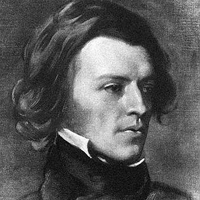Alfred Lord Tennyson - Biography and Works
Alfred Lord Tennyson was born in Lincolnshire and was educated at Trinity College, Cambridge. At Cambridge, he soon became known for his poetic ability that won him the friendship of the young poet Arthur Henry Hallam. Later on, in 1833 Hallam died and Tennyson was left sad and heartbroken.

Alfred L. Tennyson (1809-1892)
The sorrow of the poet may be read in his great elegy In Memoriam and in such moving lyrics as Break, Break, Break. In his long poems like Maud, the poet expresses the doubts and faiths of his age. But his smaller poems like Tears, Idle Tears and On Crossing the Bar are even lovelier and more popular. Tennyson’s greatness as a poet lies in the depth of his feeling, the sensitive music of his verses and his word pictures that are full of delicate touches of light and color. His poetic merit got the highest recognition when in 1850 he succeeded Wordsworth as the poet Laureate and was made a peer in 1884. Tennyson earned this position in literature because of the remarkable range of his talents and his dedication throughout his long career to perfecting his art. Tennyson stands both as a great national poet and as one of the supreme craftsmen in the English language.
Tennyson entered in poetry under the influence of Byron and Keats. So his poems are romantic in tone and temperament, but he is largely classical in form and structure. He lays stress on the need of discipline in art. The Function of the poet, for him, is to penetrate and interpret the spirit of his own age for the future generations, so he was the voice of his age and his poems exhibited the society, the art, the philosophy and the religion of his days. Though Victorian poetry avoided directness of Romantic poetry, but much of Tennyson’s poem bear romantic tone and temperament.
Tennyson is regarded as one of the major Victorian poets and poet laureate of England, who is now best-known for the elegies written on the death of his college friend Arthur Henry Hallam. But he was the most versatile and skillful poet of his time, writing all kinds of poems. Few poets have produced acknowledged masterpieces in so many different poetic genres as Tennyson; he furnished perhaps the most notable example in English letters of the eclectic style. His masterfully designed poetry expresses so clearly the Victorian feeling for order and harmony in readily understandable words. But one bitter incident in his life almost prevented Tennyson from writing. The sudden death of his friend Arthur Henry Hallam in 1833 produced in Tennyson a profound spiritual depression, and he promised not to produce any more poems for a period of ten years. But, while refusing to publish, he had somehow continued to write. Later, Tennyson produced the most popular volume of his poem In Memoriam, a collection of elegies on the early death of Hallam, which led to a lifelong conflict in his mind between faith and doubt, and influenced much of his writing. Most of his greatest poetry resulted from his struggle with that grief, from which he never fully recovered. For him the sound of poetry was more important than the actual experience of the poet. That is why he was capable of even modifying his experience if it were necessary to adjust the sound. His poetry is pleased with its lulling lyrical quality. Some of his much anthologized poems are “The Lady of Shalott,” “The Lotus Eaters,” “Ulysses,” “Tears, Idle Tears,” “Break, Break, Break” and “The Charge of the Light Brigade.” Among his longer poems are Locksley Hall (1832), In Memoriam (1850), and The Idylls of the Kings (1857-85).
Tennyson’s influential place in the intellectual life of his age comes largely from his concern with the vital issues confronting Victorian England. He reveals his sense of political responsibility in such patriotic verses as “Ode on the Death of the Duke of Wellington” and his famous “The Charge of the Light Brigade,” which was inspired by an incident in the Crimean War. Maud, a narrative in the form of separate lyrics describes the withering effect of the materialist spirit of his day on a sensitive young lover.
Cite this Page!
Sharma, K.N. "Alfred Lord Tennyson - Biography and Works." BachelorandMaster, 21 Oct. 2013, bachelorandmaster.com/biography/alfred-lord-tennyson.html.
Related Topics
Break, Break, Break: Literary Analysis
Break, Break, Break: Critical Analysis
The Lotos Eaters: Critical Analysis
Victorian Consciousness in The Lotos Eaters
Lady Clare: Summary and Analysis
The Eagle: Fragment: Summary and Analysis
Tears, Idle Tears: Summary and Analysis
Elegy- Definition of Literary Term
Lyric- Definition of Literary Term
Salient Features of Victorian Literature
 |
bachelorandmaster.com |